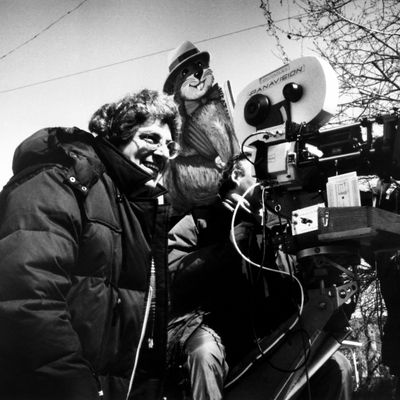
Harold Ramis, the co-star of Ghostbusters and director of Caddyshack and Groundhog Day, was a famously menschy and stable guy in a sea of loons ÔÇösome of them not so menschy or at the very least troubled, needy, and subject to unending insecurities. You could argue that said stability contributed to his less-than-electric presence onscreen, and he would actually have been the first to agree. Ramis said he realized one night while performing at ChicagoÔÇÖs Second Stage that he could never compete for laughs with John Belushi ÔÇö a whirlwind, a force, a man who followed his demons. What Ramis followed was in some ways more mysterious. The ones who cultivate an inner calm while others are dropping around them might well have the tougher job. He was a straight man on and off the screen. But oh, what timing.
He began by penning jokes for Playboy, then moved into the world of the National Lampoon, where he worked on its short-lived but beloved Radio Hour beside some of the most iconoclastic writers in comedy ÔÇö Doug Kenney, Henry Beard, Michael OÔÇÖDonoghue, and eventually fellow Chicagoan John Hughes. That led to Second City with Gilda Radner and Belushi and a stint at SCTV and then co-writing the seminal slob comedy of (maybe) all time, Animal House. His first feature as director, Caddyshack, was a mess (loathed by co-writer Kenney, who would fall off a cliff and die while in the throes of his dismay at the producersÔÇÖ editing choices), but one that somehow cohered and became a monster hit. Ramis had learned from Ivan Reitman (the director of Meatballs, Stripes, and Ghostbusters, all of which he co-wrote) to cast clown princes and let them find their own rhythm. In other ways, though, he was the opposite of Reitman, known in some quarters for his nastiness. Ramis kept himself centered so that others could bounce off the walls.
IÔÇÖm guessing his Buddhist leanings helped give Groundhog Day its easy tempo and core of emotional truth: the yearning to go back in time ÔÇö again and again and again ÔÇö and get things ÔÇ£right.ÔÇØ What MurrayÔÇÖs character finally learns is the Zen ideal: to live in the present moment but with a kind of 20/20 hindsight. The film is ÔÇö with 20/20 hindsight ÔÇö one of the best of the ÔÇÿ90s, underrated in its day the way virtually all mainstream Hollywood comedies are. And how many directors can say that they have redefined a holiday for all time? On February 2, many of us still wake up hoping to hear ÔÇ£IÔÇÖve Got You, BabeÔÇØ and Frankie YankovicÔÇÖs ÔÇ£Pennsylvania Polka.ÔÇØ
Ramis had an awful time on Groundhog Day with Murray, with whom heÔÇÖd worked on Caddyshack, Stripes, and, most famously, as Egon the thick-lensed brain in Ghostbusters and the underrated Ghostbusters II. During a Q&A with me while promoting his lone noir, The Ice Harvest (sardonic but not a comedy), he said that Murray had become impossible even by MurrayÔÇÖs standard. They didnÔÇÖt speak again until shortly before his death, when the two reconciled. He was, I guess, someone you donÔÇÖt want to let go without thanks.
At our Q&A, I mentioned how much I loved Groundhog Day and National LampoonÔÇÖs Vacation and Analyze This, and waggled my hand to suggest I thought Analyze That wasnÔÇÖt up to snuff. He looked enormously hurt. ÔÇ£What? You didnÔÇÖt like Analyze That?ÔÇØ he asked, with heartbreaking ingenuousness. ÔÇ£Huh.ÔÇØ I know that no one likes to hear that any of their movies arenÔÇÖt up to snuff, but it occurred to me a minute too late that Ramis was one of those people who put his heart into everything.
He kept his life ÔÇö the last part of which was spent in Chicago ÔÇö on an even, Buddhist keel while devising parables that expressed his more innate belief: that the world was absurd and cruel and ridiculous. It has been the religion of Jewish comics at least since Moses saw his tribe worship false idols and smashed the Ten Commandments and then looked back up Mount Sinai and said, Oy. But in all those parables ÔÇö from National LampoonÔÇÖs Vacation to Ghostbusters II to Groundhog Day to Multiplicity and lesser films ÔÇö Ramis could right humanityÔÇÖs overturned ship in ways that never seemed cheap. He brought an orderly frame to unruly passions. He upended us with laughter and kept us grounded.


